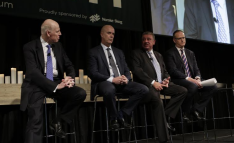News Corp CEO admits to ‘head winds’ but claims trend lines are ‘heading the right way’
CEO of News Corp Australia Julian Clarke has sought to downplay a damaging leak of internal financial information by this morning telling a forum of newspaper publishers that he was “not too worried about it”.
Asked by Future Forum panel moderator Russel Howcroft about yesterday’s leak, which was revealed by news website Crikey (paywall), that showed the News Corp’s Australian newspaper division dropped $320m in ad revenues and cut one in eight jobs in the 2012-13 financial year, Clarke said the issues facing the newspaper industry were universal but that with good strategy they could be overcome.
“I can confirm it was an interesting day,” said Clarke. “I won’t say too much more than what I’ve said to our staff and that is what was published was 14 months old. No one is in any doubt about the headwinds that all of us are facing and continue to face.
“My reaction, to any of this, is to say reality is the first thing you have to acknowledge and then you start to devise your game plan around it.”
Clarke was on a panel with three other newspapers CEOs, Fairfax’s Greg Hywood, West Australia News’ Chris Wharton and APN’s Michael Miller at the The Newspaper Works Future Forum.
He told the forum that newspapers were being disrupted ahead of other industries but that News Corp’s trend lines were positive
“Our industry has been hit harder and earlier by the disruptive technologies. There is no doubt about that but the flip side of that is that we have had longer to work it all out,” he said.
“Certainly in our own company News Corporation we are very certain about where the future is and how we go about it. So I’m not too worried about what was published yesterday. All of the trend lines that I am responsible for – and that is only in the last 12 months – are all heading the right way.”
Asked about the importance of newspaper promotion and marketing Clarke also took indirect aim at his predecessor Kim Williams who told Fairfax in the wake of the revelations he expected a “festival of vengeance against me”, replying: “It is all of the above but you have to manage your brand absolutely.
“One of the mistakes we have made within our own company within recent times, if I can reflect back a little is that we stopped (print marketing/promotions). You need people talking about the paper and activating the paper so you give people a reason to go and buy the paper, a special different reason to buy the paper – that’s important.”
At the end of the session Clarke agreed to answer questions from the media off stage, where he downplayed the losses at The Australian which, according to the leaked accounts were $27m in 2012-13.
Addressing the reporter from Crikey, Clarke said: “Don’t worry about The Australian. The Australian is our premium product, we love it dearly, it is doing very very well and quite frankly what you guys (Crikey) have published is 14 months old — ask me about what has happened in the last 12 months.”
However, when asked Clarke declined to specify what those changes were, but noted the political influence of The Australian, adding: “I’m not going to tell what our trading position is. I’m not going to respond to your questions about any sort of financial matters inside our company.
“But just have a look at our assets though and if you guys didn’t want to own The Australian there would be something wrong with you. Absolutely it is the go to newspaper in this country. It is the most influential newspaper in this country without any doubt.”
Clarke was also asked how long will News Corp was willing to sustain losses on newspapers like the Australian to which he responded: “The shareholders vote everyday with the share price. The share price of News Corporation, which is only 12 months old, is above what it was when it launched. Make sure you print that.”
News Corporation assets include British and US newspapers, as well as the 50 per cent share of pay-TV provider Foxtel and the 62 per cent holding in REA Group.
Nic Christensen



“not too worried” about the leaks, huh, Julian? You might want to talk to the boss (Mr Murdoch) about that: he’s just gone on record threatening legal action against media organisations that report on it.
Bollocks
Isn’t the share market also up over that same time period? So was the boat floated by the rising tide?
As the Black Knight would say: “It’s just a flesh wound.”